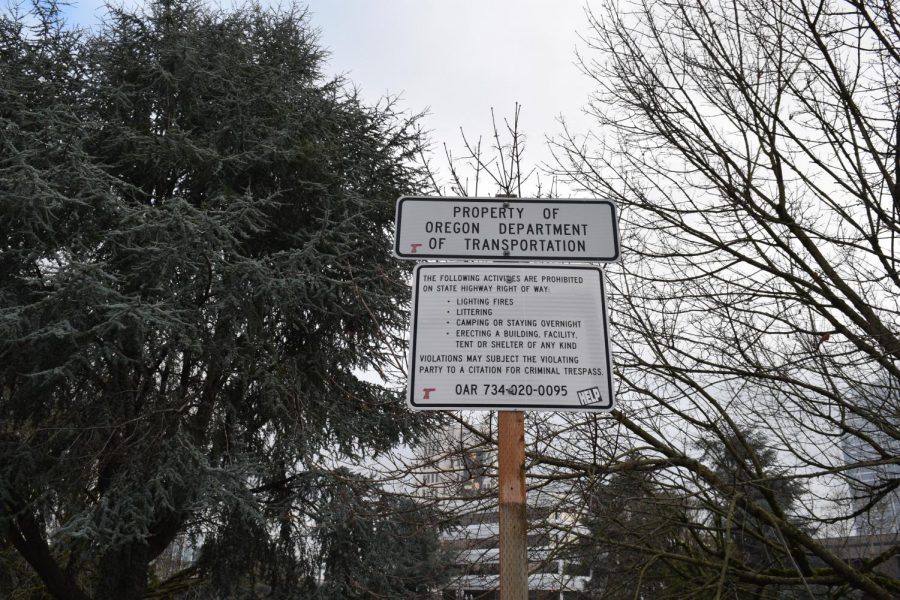Houselessness concerns students and staff
Signs are posted along NW 15th stating regulations that houseless citizens must abide to.
Camps belonging to houseless people border the sidewalks of NW Salmon Street and can’t be missed by students dropped off for school or walking to Westside during break. Some have been relocated or removed by the city, but others still remain in place.
Lincoln has a history with houselessness that has led to both dangerous and harmless situations. According to September 2016 and February 2016 articles in the Cardinal Times, some camps have had drug involvement leading to an on-campus death, and others politely leave when asked.
According to Heather Hafer, spokesperson for Homelessness and Urban Camping Impact Reduction Program and the City’s One Point of Contact (OPOC) Campsite reporting system, there have been 373 reports of homeless camps within 700 feet of Lincoln since Aug. 1, 2019.
“It is illegal for [the houseless people] to be there, but since the need is so large, we must prioritize,” said Hafer. “Lincoln is a popular spot.”
Often, the camps will disappear without a trace, leaving people confused about where they went. The Homelessness and Urban Camping Impact Reduction Program contributes to that removal.
“We engage with the campers and identify what is their personal property and what is garbage. Their personal items are stored in a warehouse until retrieved for up to 30 days,” Hafer said.
Hafer’s answers align with the Portland City code which states, “It is unlawful for any person to camp in or upon any public property or public right of way, unless otherwise specifically authorized by this Code or by declaration by the Mayor in emergency circumstances,” under section 14A.50.020.
Many students and faculty at Lincoln have concerns about the homeless camps around Lincoln.
Alex Stegner, a social studies teacher at Lincoln, has concerns about the safety of students, as well as how the people living in these communities are treated. Stegner wrote a response to houselessness at Lincoln in the Oregonian in January last year.
“In some ways, it’s necessary [to remove homeless camps] because obviously we don’t want people coming through our schools that are dangerous,” said Stegner.
There is a level of fear that surrounds these camps, and even teachers like Stegner have experienced it.
“[A houseless person] followed me. I was really nervous, I was scared,” Stegner said, remembering an experience he had walking from his car into the school earlier this year.
Stegner also recognizes Lincoln students’ ambition to support the people that experience houselessness and wants to see a reflection of that in other parts of the school.
“It’s everybody’s problem. It’s not just the people involved in homeless services or government. A place like a school should be the center of the community, so we should be on the front lines,” said Stegner.
Junior Natalie Solomon is the co-founder and co-president of Flockfeast, a student-run club that cooks and serves food for members of the houseless community. Flockfeast actively works to serve members of the houseless community. Solomon has noticed the camps around Lincoln.
“[Houseless people] being around the school causes a lot of fear in students along with a lot of misunderstanding and stigma around being houseless,” said Solomon.
According to the United States Interagency Council on Homelessness, an estimated 15,876 people in 2019 experienced homelessness/houselessness in Oregon. Out of those 15,876 people, nearly 61 percent are unsheltered and living outdoors, while almost all lack access to resources such as healthcare.
“A lot of the time, these people get kicked out or criminalized when in reality they probably need help or assistance,” said Solomon.


